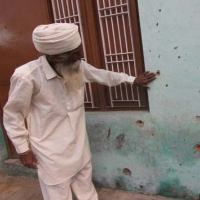Firing Along Border Threatens India-Pakistan Ceasefire
 A villager shows bullet marks on the wall of his house after firing from Pakistan (photo: PTI)
A villager shows bullet marks on the wall of his house after firing from Pakistan (photo: PTI)
Thousands of civilians fled the areas along the international border with Pakistan and the Line of Control (LoC) in Jammu and Kashmir as Indian and Pakistani troops continued to exchange fire and engage in their most serious confrontation in over a decade.
Both countries also sparred at the United Nations over the ceasefire violations and New Delhi made it clear that its armed forces are "fully ready" to respond to "provocation".
The heavy shelling began more than a week ago along a 200-km stretch of border in Jammu and Kashmir, with both countries accusing each other of starting the latest hostilities. India says it will not talk to Pakistan or stop firing until its neighbour stops shelling and machine-gun fire across heavily populated border areas.
Defence Minister Arun Jaitley called Pakistan an "aggressor" and accused it of making unprovoked attacks.
"If Pakistan persists with this adventurism then our forces will continue to fight," Jaitley told a news conference in New Delhi. "The cost of this adventurism will be unaffordable (for Pakistan)."
According to Reuters, exchanges of sporadic fire are common along the de facto border dividing the region, despite a ceasefire pact signed in 2003. But there had been a long lull in fighting, so the extent and intensity of the latest violence and the number of civilian deaths is unusual.
"We do not want the situation on the borders of two nuclear neighbours to escalate into confrontation," the Pakistan Ministry of Defence said in a statement. "India must demonstrate caution and behave with responsibility."
Pakistan's Major General Khan Tahir Javed Khan, responsible for the section of the border where the violence has broken out, claimed that India had fired 20,000 shells so far this year, compared to just 200 in 2012.
He also said he had been trying to meet his Indian counterpart since the firing began, but they would not return his calls. The usual way to stop clashes is to call a meeting of senior officials at the border, but no such meeting has been held this time.
Jaitley appeared to rule out initiating talks with Pakistan. "How can we have talks when firing is on?" he asked reporters.
An estimated 30,000 Indian civilians have fled their homes in the lowlands in Jammu to escape the fighting, taking refuge in schools and relief camps.
"When will this stop?" said 65-year old Ram Lal in Arnia, the village worst affected by shelling on the Indian side. His wife had a bandaged arm after sustaining a small injury when two shells landed early on Thursday.
"We should have it out once and for all. What's the use of dying each day like this? Have a full-scale war and be done with it," Lal told Reuters.
This is the first major fighting with Pakistan since Prime Minister Narendra Modi took office in May. It comes after weeks of destabilising anti-government protests in Pakistan and just a few days ahead of state elections in India, for which Modi has been campaigning.
"I don't need to speak, our guns will do it. We have responded with courage to ceasefire violations," Modi said at a campaign rally on Thursday.
An unnamed senior Indian army officer in Kashmir told Reuters that the violence suited both sides, with Pakistan's army taking a more assertive role in politics and Modi displaying a more muscular foreign policy ahead of elections in Maharashtra and Haryana.
To Learn More:
India, Pakistan Signal Possible Escalation of Hostilities (by Niharika Mandhana and Qasim Nauman, The Wall Street Journal)
Kashmir: India and Pakistan warn each other over attacks (BBC News)
India and Pakistan trade warnings over heavy Kashmir fighting (by Sanjeev Miglani and Abu Arqam Naqash, Reuters)
Shelling continues at India-Pakistan border, 18,000 civilians flee homes (Economic Times)
- Top Stories
- Controversies
- Where is the Money Going?
- India and the World
- Appointments and Resignations
- Unusual News
- Latest News
- India College Chain’s Expansion into U.S. Draws Opposition from Massachusetts Officials over Quality of Education
- Milk Shortages in India Tied to Release of New Movies Featuring Nation’s Favorite Stars
- Confusion Swirls around Kashmir Newspaper Ban in Wake of Violent Street Protests
- Polio-Free for 5 Years, India Launches Vaccine Drive after Polio Strain Discovery
- New Aviation Policy Could Increase Service, Lower Ticket Prices






Comments